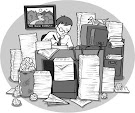A blog about the painful journey to become a better teacher - including all of the bumps that are involved.
Friday, January 30, 2009
The Moral Dimensions of Teaching
- Steven Baugh, in The Moral Dimensions of Teaching.
Thursday, January 29, 2009
Tech Savvy Teacher
Gabriela Sanchez, third grade teacher at
Rather then teaching my rote, Sanchez has decided to allow her students to work from their own misconceptions about the moon and how it orbits, to learn how it really moves.
Her students first form their own hypothesis about how the moon moves around the earth. They drawn on a regular piece of paper their hypothesis.
This drawing, done by Louis, shows a common misconception that many third graders have. Rather then drawing a spherical or elliptical orbit, Louis draws a circle to show the moon’s orbit.
Due to a grant from the Rotary, Archive Elementary has recently acquired a classroom set of laptop computers. Sanchez downloaded a free program called Celistia, which give kids a chance to explore the universe in a virtual setting. It includes 3D pictures of all of the planets, moons, their orbits and so forth.
Sanchez then has her students zoom in on Earth in the program.
After finding Earth students must access their prior knowledge of the moon to find it. Once they find it they must then zoom out so the can see both the Earth and the Moon.
After they fix their view like this, students start the simulation. Celistia allows users to ‘speed up’ time. Fast enough that they can see the moon as it moves through space.
While they watch this action, the students are challenged to draw how the moon is moving around the Earth.
Once they have completed their picture students are allowed to turn on a feature in Celestia which outlines the orbit which the Moon follows around the Earth. They check to see how closely their pictures have come to the reality.

Sanchez based her lesson on the third grade science standard one objective two which states that students should be able to “describe the movement of Earth and the moon and the apparent movement of other bodies through the sky.”
Wednesday, January 28, 2009
Parallels
I hope I can continue to find these parallels and keep them in my heart as I begin teaching for real.
Monday, January 26, 2009
Stellarium
I think this is a remarkable program I am happily downloading onto my computer for personal use.
Stellarium Download
TPACK

TPACK has three segments.
1) Content Knowledge.
2) Pedagogical Knowledge
3) Technological Knowledge
Often teachers only combine Content and Pedagogical knowledge, but ignore the technologies available. In the scope of t his class it seems like this would only relate to the resources which would involve computers or other sophisticated technology, but I am choosing to take a broader view of technological knowledge. I would like to define technological knowledge as the tools which teachers use to teach. If a teacher is teaching about rocks, I believe it is fully applicable to use rocks within the classroom as the tools with which one studies rocks. A teacher need not be labeled as not having technological knowledge if they do not have access to advanced resources.
A successful TPACK teacher integrates all of the knowledge they have- Technological, Pedagogical and Content. They realize that students need to be taught in all of these areas and using all of these skills. Other professions (science or math majors for example) may only need two, but teachers are required to have all three.
Monday, January 19, 2009
The New Science of Happiness
It is funny really, a lot of the ideas espoused here have been a portion of mainstream Christian thought for generations. It makes sense.
RSS and Web 2.0
I can see how I would use the goodreads as an educator. When I begin teaching I will not have my Tunnell Jacobs software at school and thus will not have my database of books at my fingertips. The goodreads allows me to connect with other educators and keep up on what I have read and thus what I can suggest to my students. It will also be a good resource for my students because they will be able to get on, on their own time, and see what I've read and perhaps pick their own choices out of that.
Thursday, January 15, 2009
Racism Videos
Okay, you can skip most of them. But look at the bottom one, Everyone's a Little Bit Racist
Babies Buying Babies
Click on the orange Full Episode button, allow it to load, then fast forward to 41 minutes.
Sickening.
Tuesday, January 13, 2009
Thursday, January 8, 2009
Technology Experience
I am fairly competent when using the internet, though I do not tend to stray to many new sites. I enjoy playing other text based games other then ansible, such as FracturedMoo and Harper's Tale. I use the social networking site Facebook.
Beyond that, I have basic skills in Microsoft Word products, and as a PC user manage to hold a grudge against Macs. I know a few shortcuts (alt+tab) and such for navigating using my keyboard. The biggest issue I have with Mac computers is their different buttons. Rather then use ctrl and the windows nagivating button the apple button is used quite a bit more.
I can fix basic hardware problems, and can usually figure out if a problem arrises from hardware, software or user-interface malfunctions. Not always however. It has been decided that technology has an abiding dislike for me. If I require more in depth knowledge then I have I can usually find what I want, usually using Google, though at time I deviate and use Wikipedia, though this is a shame I hardly dare to admit to my wikipedia crazy friends.
At one point I desired to be a computer person, but no longer.







